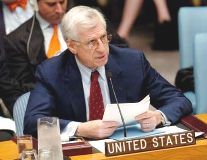Security Council demands Sudan rein in militias or face sanctions
By EDITH M. LEDERER, Associated Press Writer
UNITED NATIONS, Sep 18, 2004 (AP) — The U.N. Security Council approved a resolution Saturday threatening sanctions against Sudan unless it acts to rein in Arab militias accused of violence in Darfur that the United States has called genocide.
 The vote was 11-0 with four abstentions. China, Russia, Pakistan and Algeria opposed sanctions and several other provisions that they said could antagonize the Sudanese government and end its cooperation with international efforts to cope with the massive humanitarian crisis in Darfur.
The vote was 11-0 with four abstentions. China, Russia, Pakistan and Algeria opposed sanctions and several other provisions that they said could antagonize the Sudanese government and end its cooperation with international efforts to cope with the massive humanitarian crisis in Darfur.
The United States, which introduced the resolution, revised it three times, each time softening language to try to get broader support and avert a Chinese veto. It was only after a last-minute meeting between U.S. Ambassador John Danforth and China’s U.N. Ambassador Wang Guangya, who unsuccessfully sought additional changes, that Beijing said it would abstain rather than exercise its veto power.
The resolution strongly endorses the deployment of a beefed-up African Union force with an expanded monitoring mission that would actively try to prevent attacks and mediate to stop the conflict from escalating. More than 50,000 people have already died and over 1.2 million have fled their homes to escape the violence.
It also authorizes Secretary-General Kofi Annan, who was in the council chamber for the vote, to rapidly appoint an international commission to investigate reports of human rights violations in Darfur and determine “whether or not acts of genocide have occurred.”
The conflict began when two Darfur rebel groups with roots in the region’s ethnic African tribes rose up in February 2003, accusing the Arab-dominated government in Khartoum of neglect and discrimination. The government is accused of trying to suppress the rebellion by backing ethnic Arab herdsmen known as Janjaweed, who long have competed with African villagers over Darfur’s scarce resources.
A resolution adopted by the Security Council on July 30 gave the Sudanese government 30 days to halt attacks by pro-government militias and start disarming them and bringing them to justice.
The council in the latest resolution “declares its grave concern that the government of Sudan has not fully met its obligations” in the July 30 resolution and subsequent agreements with Annan and the United Nations.
It “deplores the recent ceasefire violations by all parties,” singling out helicopter assaults using government aircraft and attacks by Janjaweed militia on three villages on Aug. 26, and demands that all armed groups, including the rebels, “cease all violence.”
The 53-nation African Union has about 80 military observers in Darfur — a region about the size of France — protected by just over 300 soldiers, monitoring a rarely observed cease-fire signed in April by the government and two rebel groups. Sudan has agreed to increased monitoring and the top U.N. envoy in Sudan, Jan Pronk, said earlier this month that more than 3,000 troops are needed.
U.S. Ambassador John Danforth said the African Union’s role is “crucially important” in helping to end the Darfur crisis and he urged the Sudanese government to act immediately to stop the looting, rape and killing or face sanctions.
On Thursday, Annan called for immediate Security Council action to halt attacks against civilians, which he said were continuing despite the government’s promise to curb militia attacks.
Algeria, China, Russia and Pakistan all supported the expanded African Union mission but said the resolution did not sufficiently take into account the efforts that Sudan has made to allow in humanitarian relief and cooperate with the United Nations.
“This resolution in the view of China is not a good resolution because … (it) might harden the position of different parties and therefore make the peace process more dufficult,” said Wang. “We don’t like the idea of sanctions and we don’t like the idea of a number of other areas. But we don’t want to throw the baby away with the bath water.”
The resolution says the council will consider possible sanctions, singling out Sudan’s “petroleum sector,” if the government doesn’t move quickly to end the conflict — and if it doesn’t cooperate with the African Union monitoring force. It says a decision on punitive measures would be made after consultation with the AU.
Sudan began exporting oil in 1999 and produces an estimated 250,000 barrels per day.
